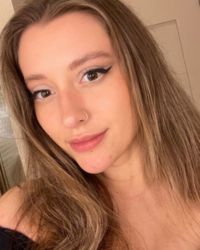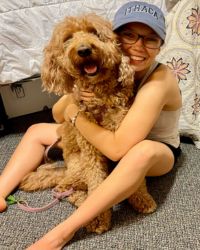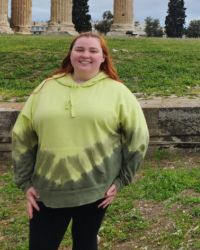The path to Case Western Reserve University is different for all students, but their varied backgrounds enrich the campus environment for all. That is especially true of our transfer students, whose paths led them to CWRU after beginning their college journeys at other institutions.
Whether a student first earned an associate degree from a community college or attended another university that wasn’t the right fit, CWRU offers them a chance to expand their knowledge, pursue new opportunities and connect with a vast network of faculty, staff, students and alumni.
In honor of National Transfer Student Week (Oct. 16–20), The Daily spoke with three transfer students who shared their experiences at CWRU—and how those experiences have shaped their future plans.
Answers have been lightly edited for clarity and length.

Sarah Boyd
Originally from Mansfield, Sarah Boyd came to CWRU after stints at John Carroll University and Cuyahoga Community College (Tri-C). Here, she’s majoring in French and Francophone studies and political science, and plans to graduate in spring 2025.
1. Can you describe your experience as a transfer student at Case Western Reserve University? What motivated you to transfer here?
My experience has been great! I started at John Carroll right after high school and honestly, I was not ready—both mentally and financially—to be a full-time student and I was unsuccessful (to say the least). I took a few years off, working full time in restaurants and modeling professionally. During the pandemic, I, like everyone else, became unemployed, which enabled me to receive a Pell Grant. The grant, along with being seen as an independent in the eyes of FAFSA, allowed me to return to my studies.
I enrolled at Tri-C intending to take a few courses there and then transfer out, which proved to be a complete 180-degree turn from my time at JCU. At Tri-C, I was able to join the Cleveland Humanities Collaborative (CHC) and be dually enrolled at Tri-C while also taking humanities courses here at CWRU. The CHC program is where I fell in love with CWRU’s campus and community. Being a part of that program made me want to strive for more than just the average, which led me to enroll full time here after earning my [Associate of Art degree] last semester.
2. What challenges did you face during the transition to CWRU, and how did you overcome them?
The biggest challenge I have noticed is the very low number of transfer/non-traditional students. I am a bit older than the “standard” college student, which does feel strange at times. The insecurity about my age might always stay with me, but everyone has been so kind and accepting.
3. Were there any specific resources or support systems at Case Western Reserve University that aided in your transition as a transfer student?
My CHC advisors here have been invaluable resources. They have advocated for me when I felt I couldn’t for myself, and their belief in my success had made me more confident. The Commuter and Off-Campus Student Association (COCO) has also been a great resource to meet other students similar to me. (The lounge is also a wonderful place to nap between classes.)
4. Were there any extracurricular activities or organizations you found particularly welcoming as a transfer student?
I work at the Jolly Scholar as a work-study student, which has been so much fun! The Alliance for Nontraditional and Transfer Students (ANTS) and the aforementioned COCO have been very welcoming. Since I still work my other jobs as well, I haven’t really had the opportunity to join many clubs, but I’m hoping to get involved more next semester.
5. How has CWRU shaped your goals and aspirations?
Being here has really made me believe in myself and my future again.
6. Have there been any faculty or staff members at CWRU who have played a significant role in your transition and academic success?
My fabulous French professor, Fabienne Pizot-Haymore—I had her last semester (and currently) as a dual-enrollment student and she relit the love of French and French culture in me. She is one of the best and most supportive professors I’ve ever had, and she’s also the coolest person ever—I want to be her when I grow up. My poetry professor, Amber Kidd, is extremely supportive and an all-around fantastic instructor. And again my amazing CHC advisors: Dr. Lisa Nielson, Dr. Brian Clites and Dr. Kurt Koenigsberger.
7. What would you most want others to know about being a transfer student at CWRU?
While transfer and nontraditional students might be a small population here, we still are a part of the diversity and vibrancy of this wonderful academic community.

Emily Eckermann
Emily Eckermann, who is from Rochester, New York, enrolled at Ithaca College before coming to CWRU. She plans to graduate in spring 2025 after completing her studies in psychology and cognitive science.
1. Can you describe your experience as a transfer student at Case Western Reserve University? What motivated you to transfer here?
My experience as a transfer student has definitely had its ups and downs, but I am very thankful that I chose to come to CWRU. I chose CWRU because of its numerous clubs and organizations, and the different resources it gave psychology majors. Coming to a new college was extremely difficult and nerve wracking because I was worried that I would have trouble making friends or that the college wouldn’t be what I expected. However, by immersing myself into different extracurriculars I was able to meet so many friendly people and felt comfortable at CWRU pretty quickly. I have also enjoyed the numerous options for psychology and cognitive science classes and feel that I have really been able to individualize my schedule and academic journey here.
2. What challenges did you face during the transition to CWRU, and how did you overcome them?
The biggest challenge I faced as a transfer student was feeling left out or feeling different from everyone else. I was grouped with the incoming freshman class a lot, so it was difficult to form tight connections with them since they are not my year and I do not have the same experience they do. Similarly, it was difficult to meet people who were in my graduating class since many of them already knew each other and there were not many events that placed me with my graduating class. This was definitely challenging and it has taken me a while to meet people and form those close friendships that I wanted.
In order to overcome this my main strategy was to join as many organizations and events as possible. For instance I am a member of the ceramics club and Phi Mu, and am in the Case University Circle Orchestra and was an orientation leader this past fall.
3. Were there any specific resources or support systems at Case Western Reserve University that aided in your transition as a transfer student?
For me personally, the resources that helped the most were clubs and organizations because it allowed me to meet people who had common interests.
4. Were there any extracurricular activities or organizations you found particularly welcoming as a transfer student?
Every extracurricular activity has been welcoming in my opinion because there are always new people attending club meetings or events, whether they are fellow transfer students or are just students looking for a new activity. For me, joining the orchestra has been the best decision because it has introduced me to so many people from different graduating classes. Everyone that I have met in orchestra has been very kind and welcoming, and it is a great opportunity to make new friends since you spend a lot of time together for rehearsal and performances.
5. How has CWRU shaped your goals and aspirations?
CWRU has not only shown me that I can reach my academic goals, but it has also pushed me to expand these goals. When I came to CWRU, I was a psychology major and had no interest in other majors or minors. However, while I have been at CWRU I have been able to learn more about different disciplines that could help me with my goals after graduating CWRU. I am now double majoring in both psychology and cognitive science and have been able to learn a lot more about my preferred field of study.
After graduating I plan on attending graduate school, and my work here at CWRU has helped push me to get a PhD in psychology with the hopes of becoming a therapist. Many professors here have helped shape this goal because they have been so informative and open to talking about different career possibilities in psychology. Without the help of my professors, I do not think I would have aimed as high as getting a PhD, so I am very grateful that I have had mentors that can help me through different academic decisions.
6. What would you most want others to know about being a transfer student at CWRU?
Even though being a transfer student was daunting, coming to CWRU was one of the best decisions I made. I want other transfer students to know that yes their situation is difficult, but it will get better over time as long as you put in the work for it. So many students are so friendly and willing to help and spend time with you, and it is important to take advantage of that. I hope everyone at CWRU goes to classes and events with a welcoming atmosphere because you never know if someone around you is new and is trying to make new connections. You can never have too many friends, so be open to talking to everyone and trying to always brighten up someone’s day.
When I first came to campus I remember how good it felt to recognize people in classes and have someone to sit next to and talk to everyday, and I think everyone should strive to be someone’s familiar face so that everyone on campus feels welcomed and comfortable.

Michelle Malick
From the Cleveland suburb of North Olmsted, Michelle Malick began her postsecondary education at Cuyahoga Community College before transferring to CWRU. Here, she is majoring in art history and classics and plans to graduate in the spring.
1. Can you describe your experience as a transfer student at Case Western Reserve University? What motivated you to transfer here?
My transfer experience is a bit different from many others transferring into CWRU. I was a part of a dual enrollment program for the humanities (the Cleveland Humanities Collaborative) where I took one to two classes per semester, and wound up doing two semesters of it. Because I had some prior experience here before I transferred in full time, I was able to see if Case Western [Reserve] was a good fit for me. I really enjoyed the faculty that I experienced before transferring and because I am from the area it was nice to stay close to home.
2. What challenges did you face during the transition to CWRU, and how did you overcome them?
I feel like I had a bit of imposter syndrome that made me not want to speak or have my thoughts or opinions heard in class. I feel as though I could have been a better student when I began here at Case [Western Reserve] and honestly, looking back, I am a bit disappointed in my performance. It just took time to understand that I was not the least capable person in the class and even if I had no experience in some topics that did not make my interpretations completely invalid.
3. Were there any specific resources or support systems at Case Western Reserve University that aided in your transition as a transfer student?
The admissions office was a great help when I had questions and I had a lot. As I mentioned earlier, I had a great community with the Cleveland Humanities Collaborative. I am a first-generation transfer student, so I didn’t really have much help from my family when it came to writing my application. This isn’t really a transfer student-exclusive but I found these very helpful as a student here.
There are so many resources for students in general that I think we don’t take advantage of enough even though I think most of us know they exist. The Writing Resource Center is great even though it took me two semesters to actually go. KSL has research librarians that are extremely useful, especially when you are stuck trying to find sources for your papers. Also Ohiolink has become my best friend, as the library doesn’t have too many books related to many of the things I want to research. As art history is one of my majors, I love that we also have access to the [Cleveland Institute of Art] library.
4. Were there any extracurricular activities or organizations you found particularly welcoming as a transfer student?
I have yet to go to a club meeting for any group that was not welcoming (though I haven’t been to every club). Currently, I am a part of the executive board for the Alliance for Nontraditional and Transfer Students, which went defunct during COVID, but me and two other transfer students along with some faculty and staff (shout out to Amber, Anthony, Dr. N and Dr. Clites) have revived it. We are trying to foster a community for nontraditional students, which includes transfer, first-gen, international, those who took time in between, and anything that makes a student nontraditional. It’s hard to come in as a transfer student and have no community. The systems (I still struggle with SIS sometimes) and culture here is so much different than at the community college I went to so there was a huge learning curve.
5. How has CWRU shaped your goals and aspirations?
When I came to Case [Western Reserve] the only thing I knew was that I thought art history was cool and that it was going to be my major. I had no idea what I was going to do with it but it is something that I enjoy, from there I realized that I loved ancient art so I decided to become a classics minor and after a spring break trip to Greece, decided to become a major. I want to go into a master’s program, ideally one that focuses on art history and museum studies. I can’t say that I have a career goal that I absolutely need to fulfill, though something in a related field would be amazing.
6. Have there been any faculty or staff members at CWRU who have played a significant role in your transition and academic success?
I feel as if there are too many people to mention; quite honestly, almost every teacher I had here has impacted me positively. This is a very short list and does not reflect all of the amazing teachers I have had and their impact on me:
- Dr. Lisa Nielson has been one of the people who I have been able to go to for any of my problems, big or small, and is probably the reason that I haven’t dropped out yet.
- Dr. Clites was a big part in my transition here and is the faculty advisor for A.N.T.S. so I get to see his face quite a bit more often now.
- Dr. Byrne was my SAGES professor for two classes and made the experience fun and interesting, was very understanding of outside circumstances, and I love it every time I run into her.
- Dr. Ageh is a hoot, gives amazing advice and enjoys my enthusiasm but does not respond to my emails and owes me at the very least a coffee, if not lunch.
7. What would you most want others to know about being a transfer student at CWRU?
It’s hard to come in as a transfer student, especially finding your community here. The systems and culture here is so much different than at the community college I went to so there was a huge learning curve. It’s not impossible to learn but it takes time and it’s okay to struggle. You don’t need an A in every class you take; it is okay to just do enough sometimes.
